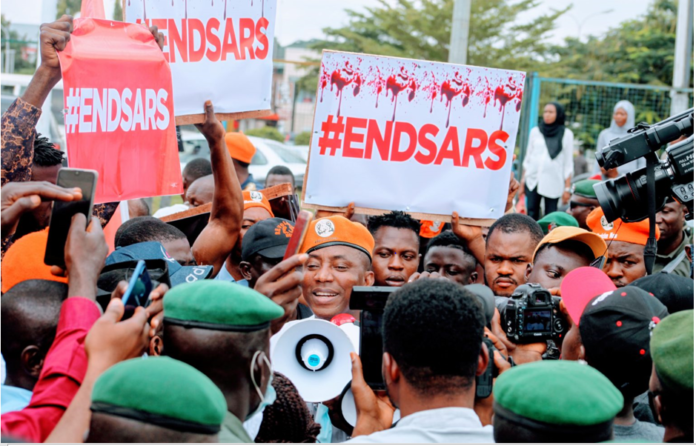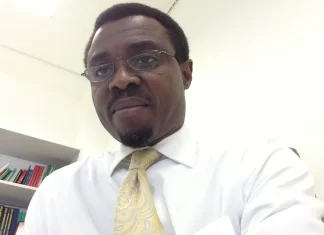EndSARS activists accuse government and police of failure learn lessons
By Jeph Ajobaju, Chief Copy Editor
Today marks the third anniversary of the EndSARS protest in Lagos and other parts of the country and the activists lament there is still no closure on the tragedy which cost the lives of hundreds of youths, many of them killed by soldiers.
The uprising over police Special Anti-Robbery Squad (SARS) was state against police brutality, particularly against young Nigerians.
Former Information Minister Lai Mohammed, one of the notorious attack dogs of former President Muhammadu Buhari, insisted, despite evidence at the time, that soldiers did not kill anyone at Lekki gate in Lagos, rubbishing the claim as “massacre without bodies” to prove it.
The Lagos EndSARS panel acknowledged in its report there was massacre at Lekki toll gate, corroborated by eyewitness, but Governor Babajide Sanwo-Olu also denied it in his remarks on the report in November 2021.
However, Sanwo-Olu has since announced a mass burial plan for 103 victims of EndSARS who are still kept in mortuaries by the state.
Lagos Information and Strategy Commissioner Gbenga Omotosho explained last week the mass burial “remains suspended to give people ample time to identify their relatives that may be among the corpses.”
He disclosed “up till now, nobody has shown up to identify any of the corpses. But the government has decided to give people more time.”
Rights activists have expressed disappointment over the fact police brutality, the major triggered of the EndSARS protest, is still very much prevalent, just as the reforms promised after the mayhem have yielded little result.
Individuals and organisation who spoke out against the injustice in a survey conducted by The Guardian include lawyers, EndSARS agitators, and the Human Rights Writers Association of Nigeria (HURIWA).
A spokesman also spoke up for the Police Service Commission (PSC).
Femi Falana, SAN (human rights activist)
“The police reforms announced in the aftermath of the protests were panic measures. They were not meant to last because police brutality has long been incorporated in the neocolonial state apparatus.
“To deal with the menace on a permanent basis as demanded by the EndSARS protesters, 28 out of the 36 state governments set up judicial commissions of enquiry. The panels probed sundry allegations of police brutality and submitted their reports.
“But state governments decided to whitewash the torture and other egregious infringements of the human rights of the Nigerian people exposed in the reports. Some token reparations were paid but the security personnel, who were indicted by the judicial panels, were not brought to book.
“The undertaking was made at the spur of the moment. Hence, no state government has set a human rights agency.
“However, the EndSARS protesters have conscientise the Nigerian people. Since the protests occurred, complaints of police brutality are promptly attended to by police authorities.
“Encouraged by such reactions, cases of police brutality are published on social media on a regular basis. In order not to be exposed, police personnel are more restrained than ever before in unleashing violence on the people.
“Justice could not have been done as the federal government was made to believe that the young protesters wanted to sack the immediate past President Muhammadu Buhari administration. Hence, the unarmed protesters were massacred as if they were coup plotters.
“No doubt, the protests have forced the police to respect the rights of Nigerians to protest against injustice and oppression. Recently, members of the Nigeria Labour Congress held protests against the anti-people policies of the President Bola Tinubu administration.
“A few weeks ago, thousands of young people trooped to the streets to demand for justice in respect of the questionable death of the Nigerian rapper and singer, Ilerioluwa Oladimeji Aloba, popularly known as MohBad.
“Unlike before, the police did not attack the workers and the young protesters. So, through the EndSARS protesters, Nigerians have regained the fundamental rights of freedom of assembly and freedom of expression.”
__________________________________________________________________
Related articles:
Lagos suspends burial of 103 victims massacred in EndSARs protests
EndSARS panel report exposes Buhari’s hand in massacre
US activist Ogebe urges UK to earmark Abacha loot for EndSARS victims’ compensation
__________________________________________________________________
Yemi Omodele (lawyer)
“Nigerians and particularly the victims of EndSARS will never forget October 20 of every year, the day is a reminder to all about police brutality, misnomers, and misdeeds in Nigeria.
“But the Nigeria police cannot change despite the huge sum of money the federal government is spending on policing.”
Wale Okunniyi (rights activist)
‘
“The bitter part of the EndSARS protest was the failure of the youth to have a clear leadership that could have engaged with the government on their behalf.
“For the youngsters, the lesson learnt is failure of not having a clear leadership; but on the part of Nigeria, there was nothing learnt.
“I can’t see any form of change with the police despite various reforms initiated after the mayhem.”
Achike Chude (rights activist)
“Nothing whatsoever seems to have been learnt from the incident three years after. Police brutality has not stopped or subsided but it has just been window-dressed.
“Many Nigerian youths are still falling victims of police brutality.”
Rinu Oduala (EndSARS activist)
“Unfortunately, three years later, citizens remain at the mercy of Nigerian police officers. True justice is about accountability, transparency, and human rights protection under the rule of law.
“But are these ideals visible in our current reality? How many reforms have actually materialised and improved police conduct and accountability?
“Despite the widespread demand for holding perpetrators of extrajudicial killings and human rights violations accountable, the findings and recommendations of the judicial panels have largely been disregarded, met with governmental silence.
“The pace of justice has been slow, allowing many perpetrators to escape accountability. These police officers have resumed their oppressive activities on the streets in large numbers, continuing the cycle of extortions, harassment, brutality, and extrajudicial killings.
“Rather than internalise the lessons from the peaceful protests of 2020, they continue to maintain hostile attitudes toward change, treating citizens with disdain. The long-standing systemic challenges within the police institution have not stopped, just like the corruption in the force.
“Three years after, SARS is still alive and the fight for justice and accountability is far from over.
“One area where police brutality against civilians is rife is police involvement in land matters and extortion, which has hit the rooftop.”
Frank Oshanugor (protection officer)
“Three years after the #EndSARS saga, I would say that not much has changed and no lessons learnt as brutality by some bad elements in the Nigeria Police Force is still prevailing.
“The only thing that has changed is just the name SARS, which has officially been scrapped but the personalities that constituted the old SARS are still in the force with their brutal attitude.
“With respect to shaping police morale left in responsible policing, I would say that the scrapping of SARS as an arm of the police brought some momentary sober reflection among the officers and men of the unit. It humbled some of the operatives who were almost seeing themselves as thin gods.
“Even though they still exhibit their old manners in their current postings, the degree of arrogance has reduced as it is now clear to them that no condition is permanent.”
Christopher Oji (security analyst)
“The police now know that if the populace do not want them, they won’t be able to operate. They now understand clearly that they can’t shoot people and go scot-free.
“With the help of social media, the public, especially the youths, are now courageous to expose police brutality and extortions.
“Before the protest, an average civilian would not waste time reporting police abuses to the authorities, because the officers would not be punished and they would end up coming after the person. Today, an average Nigerian has 50 per cent confidence that he would get justice from police authorities.
“Again, all the recommendations after the protest have not been met. The police were advised not to use live bullets during protests, but they are still being used. It was recommended that the police should use water cannons and stunt guns to disperse protesters, but they have not complied with the recommendations.”
Emmanuel Onwubiko (HURIWA President)
“Three years after EndSARS, it is safe to say that the police operatives and their officers have rather learnt the lesson upside down and have become even more devastatingly brutal to citizens they ought to work for, protect and enforce the law for the safety of the society, the security of lives and property of citizens.
“Over 85 per cent of police personnel have become very incompetent, unprofessional, and grossly undisciplined. Bribe for bail still goes on. Extortion and other criminal tendencies by police have multiplied.
“The reforms claimed to have been introduced by the federal government did not even happen in reality except on the pages of newspapers.”
Ikechukwu Ani (PSC spokesman)
“There are serious lessons learnt in the aftermath of the crisis. There is a deliberate shift to the citizen approach to policing. The Compliance Monitoring Unit set up by the PSC is obviously to ensure that citizens’ complaints against police are given the required attention.
“The PSC CMU monitors what happens in the Police Complaints Unit to ensure that police respond to complaints from citizens. The Commission is also supporting programmes to further train the police for better effectiveness and efficiency.”













